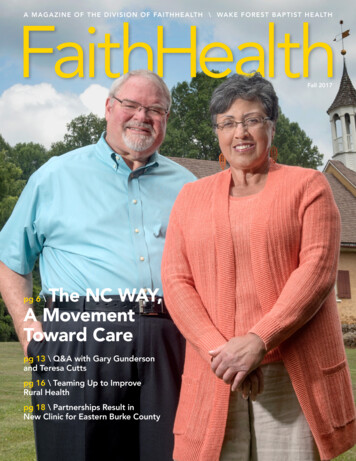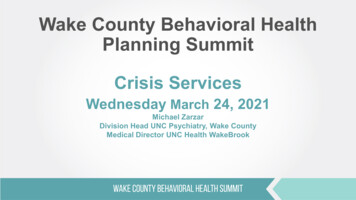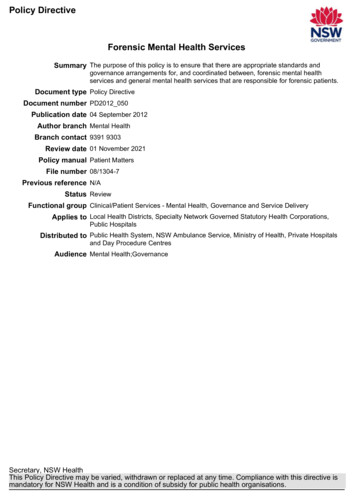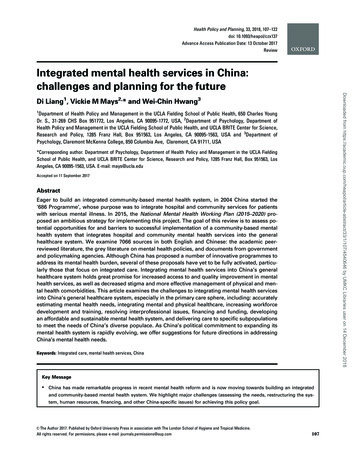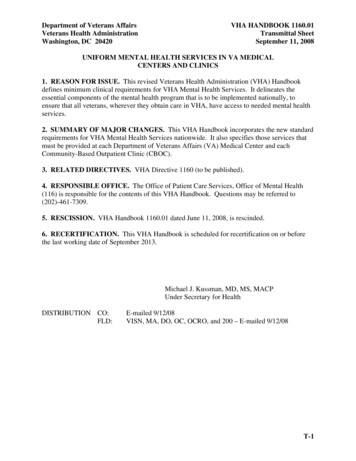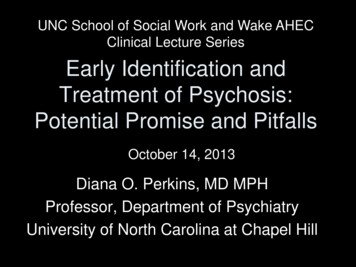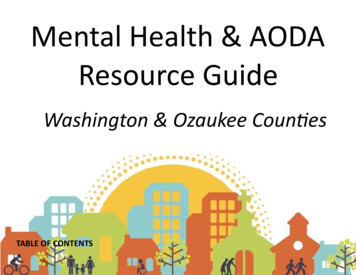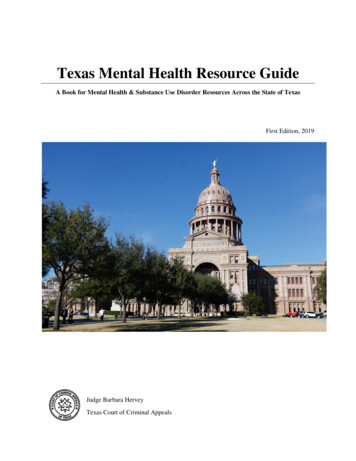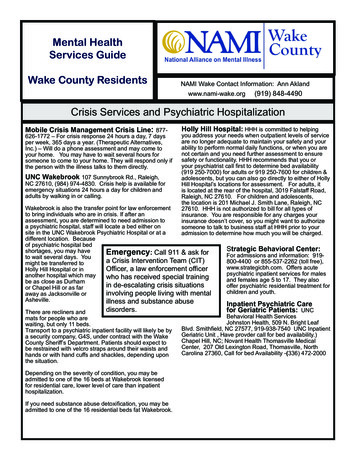
Transcription
Mental HealthServices GuideWake County ResidentsNAMI Wake Contact Information: Ann Aklandwww.nami-wake.org(919) 848-4490Crisis Services and Psychiatric HospitalizationMobile Crisis Management Crisis Line: 877-626-1772 – For crisis response 24 hours a day, 7 daysper week, 365 days a year. (Therapeutic Alternatives,Inc.) – Will do a phone assessment and may come toyour home. You may have to wait several hours forsomeone to come to your home. They will respond only ifthe person with the illness talks to them directly.UNC Wakebrook 107 Sunnybrook Rd., Raleigh,NC 27610, (984) 974-4830. Crisis help is available foremergency situations 24 hours a day for children andadults by walking in or calling.Holly Hill Hospital: HHH is committed to helpingyou address your needs when outpatient levels of serviceare no longer adequate to maintain your safety and yourability to perform normal daily functions, or when you arenot certain and you need further assessment to ensuresafety or functionality. HHH recommends that you oryour psychiatrist call first to determine bed availability(919 250-7000) for adults or 919 250-7600 for children &adolescents, but you can also go directly to either of HollyHill Hospital’s locations for assessment. For adults, itis located at the rear of the hospital, 3019 Falstaff Road,Raleigh, NC 27610. For children and adolescents,the location is 201 Michael J. Smith Lane, Raleigh, NC27610. HHH is not authorized to bill for all types ofinsurance. You are responsible for any charges yourinsurance doesn’t cover, so you might want to authorizesomeone to talk to business staff at HHH prior to youradmission to determine how much you will be charged.Wakebrook is also the transfer point for law enforcementto bring individuals who are in crisis. If after anassessment, you are determined to need admission toa psychiatric hospital, staff will locate a bed either onsite in the UNC Wakebrook Psychiatric Hospital or at adifferent location. Becauseof psychiatric hospital bedshortages, you may haveEmergency: Call 911 & ask forto wait several days. Youa Crisis Intervention Team (CIT)might be transferred toOfficer, a law enforcement officerHolly Hill Hospital or inanother hospital which maywho has received special trainingbe as close as Durhamin de-escalating crisis situationsor Chapel Hill or as farinvolving people living with mentalaway as Jacksonville orAsheville.illness and substance abusedisorders.There are recliners andmats for people who arewaiting, but only 11 beds.Transport to a psychiatric inpatient facility will likely be bya security company, G4S, under contract with the WakeCounty Sheriff’s Department. Patients should expect tobe restrained with velcro straps around their waists andhands or with hand cuffs and shackles, depending uponthe situation.Depending on the severity of condition, you may beadmitted to one of the 16 beds at Wakebrook licensedfor residential care, lower level of care than inpatienthospitalization.If you need substance abuse detoxification, you may beadmitted to one of the 16 residential beds fat Wakebrook.Strategic Behavioral Center:For admissions and information: 919800-4400 or 855-537-2262 (toll free),www.strategicbh.com. Offers acutepsychiatric inpatient services for malesand females age 5 to 17. They alsooffer psychiatric residential treatment forchildren and youth.Inpatient Psychiatric Carefor Geriatric Patients: UNCBehavioral Health ServicesJohnston Health, 509 N. Bright LeafBlvd. Smithfield, NC 27577, 919-938-7540 UNC InpatientGeriatric Unit , Have provder call for bed availability.)Chapel Hill, NC; Novant Health Thomasville MedicalCenter, 207 Old Lexington Road, Thomasville, NorthCarolina 27360, Call for bed Availability -(336) 472-2000
Crisis Services and Psychiatric Hospitalization (continued from page 1)Emergency Departments at Hospitals in WakeCounty, e.g. WakeMed, WakeMed Cary, UNC RexHospital, or Duke Raleigh. – None of these hospitalshas a mental health inpatient unit, but they will checkyou for any medical problems and determine whetheror not you need to be involuntarily committed to apsychiatric unit at another facility. (WakeMed does havea special behavioral health team that works with patientsin the ED.) If you are determined to need involuntarycommitment to a psychiatric hospital, staff will locatea bed either in Holly Hill Hospital, UNC Wakebrook, orin another hospital which may be as close as Durham,Chapel Hill or Rocky Mount or as far as Jacksonville orAsheville. You can expect to wait in the ED for an averageof 2 to 3 days. If the ED staff determine that you need tobe admitted to a state psychiatric hospital such as CentralPage 2Regional Hospital in Butner, you will wait an averageof about 4 days. Emergency Departments at UNCNeuropsychiatric Hospital in Chapel Hill, Duke Hospital inDurham, and Duke Regional Hospital in Durham. – (UNChas a special section of its ED reserved for psychiatricpatients.) These hospitals have inpatient psychiatric units,and they will check you for any medical problems anddetermine whether or not you need to be admitted. If so,you may be admitted to their psychiatric unit if a bed isavailable. If not, staff will locate a bed in another hospitalwhich may be as close as Durham, Chapel Hill or RockyMount or as far as Jacksonville or Asheville. You canexpect to wait in the ED for an average of 2 to 3 days.Transport to and from the psychiatric inpatient facility willlikely be by law enforcement or contractor transport staff.What to expect from Inpatient Psychiatric Hospitalization:Most inpatient stays are very short, 7 days or less. They are primarily intended to provide safety and stabilizationthrough medication management and a safe and therapeutic environment. It is important to have good outpatientmental health services, i.e. psychiatrist, therapist, psychosocial, etc., in place to avoid hospitalization and to maintainas much stability as possible. If you are particularly psychotic or aggressive, you may not be appropriate for admissionto a regular inpatient psychiatric unit. In that case, you may be admitted to a state psychiatric hospital bed. Thereare a very limited number of state hospital psychiatric beds so patients may wait for a week or more. For the WakeCounty area, most patients are admitted to Central Regional Hospital in Butner. On average, stays at state hospitalsare not very long—usually one to two weeks but can be as long as several months when needed. Social workers atthe hospitals are responsible for providing discharge planning which connects patients to outpatient resources in thecommunity.Insurance Coverage for Mental IllnessCoverage varies according to your policy andnetwork of providers. You need to shop around forinsurance that has a good network for mental health.Private insurance and Medicare will generally payfor inpatient hospitalization and a portion of the costfor medication management and a certain numberof therapy sessions if you and your provider meetall the requirements of the plan. Most other typesof treatment such as those listed on page 3 are notcovered. You usually will not be eligible for paymentfor these services from public funds if you haveprivate insurance regardless of the fact that yourinsurance will not pay for it. However, you may wantto contact Alliance Behavioral Health for a specificdetermination. (See next page for contact no.)Our recommendation is to first consult yourinsurance carrier’s network of providers and then totalk to others who are privately insured to get theirviews and recommendations for providers. You cannetwork with others in NAMI support groups andeducation meetings.Many psychiatrists are not on insurance panelsand require that you pay them upfront. If you haveinsurance, they may accept claims from “out ofnetwork” providers.If you are disabled by your mental illness, Medicaidcoverage may improve your chances of receivingthe care you need through enhanced services.Contact Wake County Human Services at thisnumber 919-212-7000 and ask for assistance withMedicaid enrollment. Alternatively, appear in personat 220 Swinburne St., Raleigh, NC 27610
How to Find Mental Health Services in Wake CountyPage 3If you are Insured by MEDICAID or have NO INSURANCE CoverageCall 24 hour toll-free Alliance Access and Information Line at (800) 510-9132.Alliance Behavioral Healthcare (ABH):Alliance Behavioral Healthcare is a “managed careorganization, i.e. MCO that manages the “public” mentalhealth, intellectual/ developmental disability and substanceabuse services for the citizens of Durham, Wake,Cumberland and Johnston counties. Although they donot actually provide services, their job is to manage thepublic funds from each County, the state, Medicaid, andother federal funds to ensure that individuals who seek helpreceive the quality services and supports they are eligible forto help them achieve their goals and live as independentlyas possible. These services are delivered by a network ofprivate providers who contract with Alliance.You are eligible for services through ABH if you are insured byMedicaid and live in one of these counties or if you are uninsuredand assessed to meet eligibility criteria. When you needassistance, you can find out if you are eligible by calling the 24hour Alliance Access and Information line (see above). You maylearn more about how to access public services through ABHby going to this website: ding upon the assessment, these are some services thatare available through a network of mental health providers underthe Alliance Health Plan: Assertive Community Treatment Team (ACTT)–comprehensive, personalized treatment program for peoplewho have been diagnosed with a severe and persistentmental illness. ACTT staff work with people in their home, atschool, or at work, and are available 24/7 with rapid responseto calls. ACTT employs an integrated team approach to helpindividuals with everyday basics such as getting moving inthe morning, taking medications, and making it through theday. Team members closely monitor progress to ensure thatmedication is working and being administered correctly. Theyalso help people find proper housing, sort out expenses,and build skills for the home, community and workplace. Theteam includes a psychiatrist, nurses, vocational specialists,therapists, and other mental health professionals as well aspeer support staff. The main goal of this intensive serviceis to help people remain out of the hospital and living in thecommunity. Cognitive Behavioral Therapy (CBT) – A form ofpsychotherapy that emphasizes the important role of thinkingin how we feel and what we do. Community Support – The process of working with adults orchildren and their families to develop a plan and to coordinateservices and supports to help them to reach their life goal. Crisis Assessment and Stabilization and Crisis Residential– Offered at the UNC Wakebrook Crisis and AssessmentServices, an alternative to a hospital where individuals incrisis can go to receive help; the goal is for individuals toreturn home as quickly as possible Dialectical Behavior Therapy (DBT) a specific type ofcognitive-behavioral psychotherapy developed in the late1980s by psychologist Marsha M. Linehan to help better treatborderline personality disorder. Since its development, it hasalso been used for the treatment of other kinds of mentalhealth disorders and substance use disorders. Evaluation and Testing – Collecting of information about anadult’s or a child’s and family’s life, strengths, needs andabilities in order to better develop a plan of services andsupports Housing and Residential Services – Once you are receivingservices, your provider can help you decide which residentialsupports you will need to achieve your goals; this can includevarious kinds of assistance, like rent subsidies and help withstart-up expenses, to help ensure safe, stable housing Integrated Dual-Diagnosis Treatment – Improves thequality of life for persons with dual disorders by integratingsubstance abuse services with mental health services,combining medicines with psychological, educational andsocial interventions to address the needs of consumers andtheir families Intensive In-Home Services – A team and family approachto provide intensive services for children who have seriousemotional disturbances, complex family challenges or seriousbehavioral problems likely to result in out-of-home placement Medication Management – Evaluation of medication optionsby an approved provider to determine which medicine is best,how it should be taken and whether it is working Multi-Systemic Therapy – A team and family-basedintervention designed to enhance the skills of youth and theirfamilies who have anti-social, aggressive/violent behaviors ordelinquency issues, including involvement with the juvenilejustice system Outpatient Therapy (individual, family, group) – Professionalsteach new skills or ways to cope with problems Drop-in Center – A place where individuals with mental illnesscan go to relax, participate in meaningful activity and socializein a safe environment Psychosocial Rehabilitation (club house) – A program foradults with mental illness and substance use issues toreceive support, learn new skills and be encouraged to reachtheir goals Rapid Response Homes – A safe and therapeutic short-termresidential option for children dealing with serious behavioralor emotional disturbances or family crises Respite Care –Care for an individual with a disability in thehome or other safe place so the family or loved ones can takea “break” from their care giving responsibilities (only for I/DD) Substance Abuse Detoxification – A monitored processinvolving abstinence to clear the drug from the body,accompanied by support during the physical andpsychological changes that result Substance Abuse Intensive Outpatient Treatment – Aprogram that provides the patient multiple sessions per weekto learn new behaviors, to participate in self-help groups andto practice relapse prevention strategies Substance Abuse Residential Services – Provide structured,communal living (such as halfway houses) serving as stepdown or transition from more restrictive environments Supported Employment – Helps people with disabilitiesparticipate in the labor market in jobs they prefer with thelevel of professional help they need.If you would like to view providers in the ABH network for theseservices, you will find a searchable database on this ult.aspx.
Other Mental Health ServicesPage 4Open Access - Walk-In ClinicsIf you are a Wake County resident in need of mental healthservices, you may receive an assessment by walking into theUNC Wakebrook Crisis and Assessment Center or into one ofMonarch’s walk-in mental health clinics (see below). These andother approved assessment sites or independent practitionersare able to provide a comprehensive assessment and, insome cases, provide follow-up care to individuals coveredby the Alliance Health Plan or, in some cases, by other typesof insurance. Call the 24 hour toll-free Alliance Access andInformation Line at (800) 510-9132 to learn about other options.Raleigh, N.C.1001 Navaho Drive, Suite 100(919) 856-4703Fax: (919) 856-3795Hours of Operation: Monday-Friday, 8 a.m.- 5p.m.Extended hours are offered on Mondays and Thursdays in the Raleighoffice until 7 p.m. Individuals who are emergent and walk in after 5p.m. will be served; however, routine needs may be scheduled for thefollowing morning.Friday 8 a.m.-3 p.m.Fuquay-Varina, N.C30 N. Judd Pkwy. NE(919) 567-0558Fax: (919) 552-4283Hours of Operation: Monday-Friday, 8 a.m.- 5 p.m.Cary, N.C.300 Asheville Avenue, Ste. 200Cary, N.C. 27518(919) 650-3325Fax: (919) 651-8091Open Access – Walk-In:Monday, Wednesday, Thursday 8 a.m.-3 p.m.; Tuesday 8 a.m.-4 p.m.;Friday 8 a.m.-1 p.m.Wake Forest, N.C.350 E. Holding Ave.(919) 263-9365Fax: (919) 435-1035Hours of Operation: Monday-Friday, 8 a.m.-5 p.m.Zebulon, N.C.1002 Dogwood Dr.(919) 375-4453Fax: (919) 375-4648Hours of Operation: Monday-Friday, 8 a.m.-5 p.m.Hours of Operation:Monday, Wednesday, Thursday 8 a.m.-5 p.m.; Tuesday 8 a.m.-7 p.m.;Monarch - Club HorizonA Clubhouse is a model of rehabilitation (PSR) which promotesrecovery, full community integration, and improved quality of lifefor persons who have mental health conditions that seriously impairfunctioning. Clubhouse services directly address the high risks thatpersons with serious mental illness experience with regard to frequenthospitalizations, low levels of functioning in the community, socialisolation, persistent homelessness, inappropriate incarceration, andunemployment.The program operates during regular business hours, promotingmutual acceptance, respect, and support. Persons with severe andpersistent mental illness work at their own pace to gain or regain theconfidence and skills necessary to lead vocationally productive andsocially satisfying lives. Centering on the concept of a “work-orderedday,” each “member” chooses to participate in one of several work unitsto accomplish the daily functions of the Clubhouse.The Clubhouse also provides independent housing support, assistancein attaining educational goals, and help with other life needs suchas food, clothing, transportation, physical wellness, and entitlementbenefits, and employment. (Call 919 266 2202)Clubhouse programs are known to prevent repeated hospitalizationsfor people who need coordinated, and often, elevated supports in orderto function well in the community. As an example, national statisticsshow that re-hospitalization rates for clubhouse members is 14%,compared with 44% for those not in a clubhouse setting. Club Horizonhas maintained member re-hospitalization rates of less than 10% sinceprovision of Clubhouse services began in 2004.
Other Mental Health ServicesPage 5Caramore Community - Carboro, NCCaramore Community is a structured support program for adults with mental illness. The program exists for thepurposes of promoting wellness, managing illness, and facilitating the skills needed to live and work in the community.Caramore offers a complete package to empower adults with mental illness attain their own meaningful and successfulindependence. Here’s how -- Work - Participants immediately start receiving paid work that helps them develop the jobs skills necessary toreceiving and maintaining community employment. Once ready, job support staff works with them to develop/enhancetheir resume, fill out applications, and interview effectively. Most importantly, staff will get participants a community job.The job is not complete once participants are hired.staff continue to help them navigate the challenges of communityemployment, and offer support until no longer warranted. Independence - The participants that are receiving residential services, move into a supervised apartment that allowsthem the opportunity to live in a de-stigmatized, integrative environment. While residing in a Caramore apartment,participants will save money, buy groceries, monitor medications, maintain the cleanliness of their home, and develop orrevisit those daily skills necessary to living independently. With the help of Caramore’s budgeting and finance counseling,participants will eventually move out into their own living situation with greater experience in dealing with the affairs ofresidential responsibility. Structure - Early on in the program, Caramore participants have a very structured day, which entails working Monday- Friday from 8:15am to 3:15pm. clients receive transportation to the grocery store, to mental health and physicalappointments, and in some cases to their community job when they gain competitive employment. Staff conduct dailyroom inspections, hold clients’ medications, keep up with their appointments, offer cooking and computer classes,provide nutritional counsel, and assist with the overall coordinatio
Wakebrook is also the transfer point for law enforcement to bring individuals who are in crisis. If after an assessment, you are determined to need admission to a psychiatric hospital, staff will locate a bed either on site in the UNC Wakebrook Psychiatric Hospital or at a different loc
